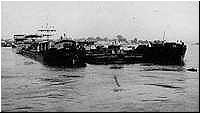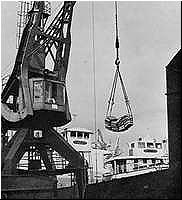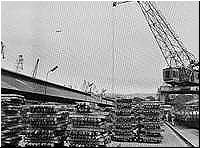| Cliquez sur cette image pour agrandir 
Un transport
ferroviaire B.C.K.

Barges
chargées de cuivre arrivant à Kinshasa

Le port
d'Albertville (C.F.L.)

Matadi, notre
grand port national, porte de sortie principale
du cuivre congolais.
|
A simple glance to a card of
the Africa Centrale is sufficient to remind to the reality those
that could be impressed again by the classic slogan of the "geological
scandal."
Our layers are indeed more or less to equal distance of the
Atlantic Ocean and the ocean Indian and this distance is
enormous. So therefore, the problems put by the export of our
products were always for us of a major importance.
During this century, the High Katanga is little by little become
the crossroads of four ways of exit toward the oceans. It is a
fundamental asset for the security of the Congolese economy
because he/it is possible to us not to be cut completely of the
outside world in case of accident on one or the other line.
The way of main export of the Gecomin is what one calls the
"national way", mid-fluvial, mid-railway. The railroad of the
B.C.K. joins Lubumbashi in Port-Francqui via Tenke and Kamina.
In Port-Francqui, the Otraco loads the copper and of the
extracts of zinc on barges that are either towed advanced until
the port of Kinshasa from where they are transported by rail
until Matadi, national sea port. It is obvious that we use by
priority and to saturation the capacity of export of the
national way.
Another way, national on a part of his/her/its course, borrows
the network of the B.C.K. until Kabongo via Kamina, then the
railroad of the C.F.L. until Albertville. The office Congolese
of the Railroads of the Big Lakes transports this copper then on
his/her/its boats until Kigoma in Tanzania where the East
African Railwayses take the copper in charge until Dar be-Salaam.
The way the most direct and shortest is the railroad of the
Benguela that crosses all the Angola since Dilolo, where he/it
is joined to the network of the B.C.K., until Lobito on the
Atlantic Ocean. Until the construction of a railroad direct
Matadi-Lubumbashi, the railroad of the Benguela is especially
the way obliged of import of a large part of the materials that
we buy overseas, because of the absence of load ruptures. It is
also the exclusive way for the export of our cobalt, whose
transportation requires the less possible transfers. The way of
Lobito is finally the most economic to the departure of Kolwezi:
it is therefore normally by her that we must export a part of
the production of the factories of the Luilu in cathodes of
copper.
The fourth way of export is the one that leads to the port of
Beira to Mozambique, after having crossed Zambia then Rhodesia.
He/it is necessary to us to send a part of our production there
to bring wagons sufficiently in view of the import in Congo of
coke and coal deWankie, indispensable fuels to our factories.
So therefore, a certain interdependence exists between the
various ways of export but these contigencies don't stop us from
granting absolute priority to the Congolese carriers. In the
calculation to the month the month of the balances between the
different ways, he/it is on the other hand a constraint that we
impose ourselves with rigor and that proceeds our role of main
supplier of the foreign currency of the Congolese Treasure.
A certain tonnage of products that constitutes a permanent wheel
exists fatally on every line, along the way: it is what we call
the "course of road" or the pipe-line" generally. The good
management of our treasury, in the perspective besides of the
one of the state, require that we maintained this course of road
to the strict minimum technically necessary at the risk of
freezing the funds that could be important uselessly. A slowing
or a momentary stop of the traffic on a way immediately provoke
an increase of the tonnage immobilized on this one and must
immediately bring us to slow down the food of it to the profit
of another way, during the time necessary to the regularization.
It is why the coordination of our export traffics requires our
part an attention of every instant.
NEXT >>
|